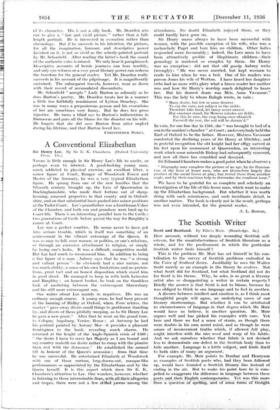Sir Richard Burton
The Arabian Knight. By Beton Dearden. (Arthur Barker.
12s. 6d.) .
BOTH these books set out to rescue the figure of Burton from oblivion. So surprisingly little has been written about the greatest of all travellers and Orientalists, that no one whose interests even' remotely include him 'should be without these books. And yet it is difficult to believe very strongly in that
oblivion. How many must owe a passion for the East to a youthful day when they first opened a volume of his translation of the Arabian Nights, and then pored over those notes, and then read the Pilgrimage, and then looked up the Ency-clo- paedia ! The figure of Burton looms so vast in the imagination of anyone at all familiar with his writings or his life, that we forget that we who have heard of him are a diminutive band. Well, these two books deserve to increase us.
The main virtue of Mi. Schonfield's work is in his accuracy and his concentration on his subject. Wherever possible he is content to quote rather than to paraphrase or describe. As a result more than a quarter of his book is occupied with Burton's own writing, and, with all its faults, what a splendid language he did write ! No biographer can hope to portray Burton as he unconsciously portrays himself in every sentence of that echoing prose ; boastful, humorous, harsh, sensitive. Mr. Schonfield's book leaves the reader with a vivid recollection of the pilgrim to Mecca, the first to penetrate Harar, and the man who so nearly discovered the source of the Nile. All this from the extensive quotations. But Mr. Schonfield's dis- crimination in quoting his subject breaks down at one point. Burton was not a poet. That fiery life seems to end with a spluttering squib when we are treated to this sort of thing on the last page : • "To seek the True, to 'glad the heart, such is the life of the HIGHER LAW,
Whose diffeeence (sic) is the Man's degree, the Man of gold, the
' Man of straw." •
. _
Burton's prose,. underrated by most readers, is not always worthily framed by Mr. Schonfield's own. This is hardly the sauce for so noble a -dish : '
"India was the talk of the town. India was News in that fateful winter of 1841.; Gilt there, &c."
Northis, of his visit tip America : " (He) . . looked sufficiently a dare-devil Dick, even had his name not been legitimately Richard."
I like no better a chapter 'heading, " Triestethe Triste."
Mr. Schonfield does Well not to obtruae On his subject, leaving it to Burton himself to sweep us off our feet, but his caution occasions one fatal understatement which mairs the book. There is barely a mention of -Burton's extraordinary
friendship with Swiitboume. . .
That criticism Mr.- Dearden's book does riot inetir. It is unfortunate that he should have chosen the title of his work from a silly play on words, as this gives a Wring -inipreseion
of its character. His is not a silly book. Mr. Dearden sets out to give a "fair and vivid picture" rather than a full- length portrait. He is interested in evocation, rather than chronology. But if he succeeds in his intention, the picture, for all the imagination, humour, and descriptive power la% ished On it, is not so vivid as the soberly-painted portrait by Mr. Sehonfield. After reading the latter's book the sound of the authentic voice is missed. We only hear it paraphrased. Descriptive accounts of heroic journeys can bore terribly, and only eye-witness or a very great literary power can redeem the boredom for the general reader. Yet Mr. Dearden really succeeds in his account of the pilgrimage. It is magnificently sustained. The subsequent travels, however, wear us down with their record of accumulated discomforts.
Mr. Schonfield " accepts " Lady Burton as solemnly as he does Burton's poetry.. Mr. Dearden treats her in a manner a little too faithfully reminiscent of Lytton Strachey. She was in many ways a preposterous person and his evocations of her are sometimes very funny. But he does her gross injustice. He turns a blind eye to Burton's indiscretions in I)amascus and puts all the blame for the disaster on his wife. He forgets that she did save Burton from utter neglect during his lifetime, and that Burton loved her.
CHRISTOPHER SYKES.

















































 Previous page
Previous page